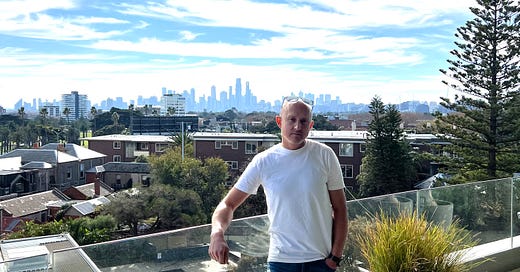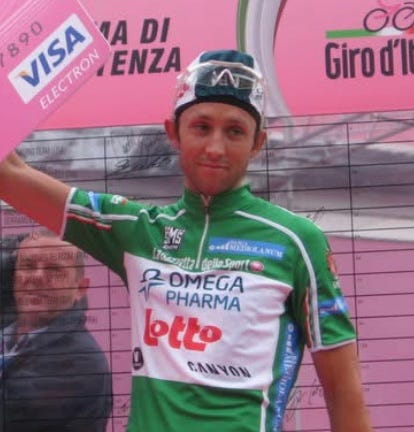‘Sideways and buckled’: Matthew Lloyd reflects on year in rehab
“You can only die so many times and still survive,” says the former Aussie racer.
The Giro d’Italia is playing out when Matthew Lloyd sends Spokes a private message on social media.
The retired Australian cyclist was a regular feature at the three-week race during his eight-year pro career, notably winning a stage and the mountains classification with OmegaPharma-Lotto in 2010.
It’s been seven years between catch-ups with the now 42-year-old, who spent 2024 in rehab for what he describes as drug, alcohol and behavioural change.

The last time we spoke before this was for a Procycling magazine feature in 2018, when Lloyd recalled being hit by a car while crossing a road in the US, where he’d been competing for a domestic team, in 2014.
“All I can remember is waking up and the helicopter pilot was down on his knees saying, ‘Do you have health insurance?’ Five-and-a-half or six days later I woke up again. They had to place me in an induced coma,” Lloyd had told me then.
“Both legs were broken. Both hips were smashed. I think the thoracic spine from T5 to T8 shattered. There were nine ribs that were broken, lacerations to the liver, spleen and stomach. Fractured skull, and the brain injury.”
Lloyd’s body is battle-tested. His cycling career was also punctuated with crashes in racing and training that resulted in broken bones and spinal injuries, contributing to his ultimate withdrawal from the sport.
Lloyd turned pro with Predictor-Lotto in 2007 and celebrated his greatest successes with the team before being dismissed for “behavioural reasons” in April 2011. He signed a two-year contract with Lampre-ISD in 2012, finishing second to Simon Gerrans at the national championships that year. However, injuries in 2013 reduced his season with the Italian outfit to three months. He competed at the Tour of California with Jelly Belly p/b Maxxis in 2014 before the hit-and-run in August that he says was a “huge component” of what later unfolded.
“The rehab situation shed light on quite a few of the behaviours that took place before that event itself and a lot of those were around, you know, escapism and avoidance when it came to difficulty, and using alcohol as a tool to get over that,” Lloyd tells Spokes.
“But with a horrendous accident, as that was, the sheer amount of medications and eventually alcohol were so tremendous that it formulates its own mask and with the characteristics of your personality turn out to be a complete horror show.
“I suppose it had been over 10 years of hiding … lacking accountability and accepting in the position that I was, and just not being in a position to address it properly due to the mindset I had at that point.”
Lloyd is currently living with his brother in Melbourne’s south-east, actively reaching out to familiar faces. His brother has introduced him to Be Future Fit – an organisation that offers courses and initiatives to help athletes transition into other careers. “Being at my brother’s is a good stabiliser, family connection and friends are close by.”
On the mend, he can now pinpoint moments in his cycling career, and in retirement, that triggered avoidant and ultimately addictive behaviours.
“One of the biggest challenges for me was to recognise and accept the fact that I wasn’t going to be who I was in 2010,” he says.
“Even before the first race with Lampre, 2012, I’d gone through a similar pattern of training and progress, which I knew to be workable myself, came second at the national championships to Simon, and beforehand, thinking back now, I’d been struggling with similar issues; Training and routine, but mixing that with really edge-of-the-fence physiological limits when it came to alcohol abuse.”
Lloyd, like many athletes across national and international codes, also found the transition from being a professional athlete into the real world, if you like, tough. Not only did it require new skills, or different use of skillsets, but it was also a dramatic lifestyle change.
“Looking at other people succeed in various different sports is fantastic and I love every element of it, but considering the travel, how invested I would see myself becoming in the cycling world and not being able to do it myself, it didn’t really do it for me,” he says.
“During the most addicted phase that I was - to avoiding and escaping things – [I] still managed to do things like get my level three and four certification in personal training, and the sports psychology degrees … but choosing a field to do the things was tremendously challenging.”
Lloyd says that in 2022 he underwent multiple 28-day stints in a private rehabilitation facility, but it wasn’t sufficient, adding he was not at the time open to mental health programs provided by national sporting organisations and institutes.
“I was so closed off from myself that even had there been access to support mechanisms I didn’t feel in the position to reach out,” he says.
It wasn’t until a family intervention led by his brother that Lloyd says he accepted that he needed help and signed-on for a year in a rehabilitation centre outside of Melbourne.
“Telling people that were close to me that this was what needs to happen was the greatest sensation because most of them said, ‘Yeah well obviously we knew that.’ All the people I was letting down because I wasn’t able to provide them the best of myself … I just knew that it was go-time, and there was no looking back. I had to address it.
“As sideways and buckled as I was, it was then that it had to take place. I mean, you can only die so many times and still survive.”
Lloyd has found comfort in sharing his experience and in doing so has also realised that he’s not alone.
“Throughout the process you discover people from all circles have experienced very similar events in their lives and faced the same challenges to bring themselves out of it,” he says.
A hip replacement in rehab has limited what Lloyd does on the bike and running has become an outlet albeit one he monitors.
“I actually started to run, and I was even getting to the point where I thought is this a similar type behaviour that I used to ride myself into the ground, to avoid something,” he says openly. “But because I’ve been mindful of that it hasn’t got to the point of extreme output. It’s enough to be comfortable, and I’m doing a bit of stuff indoors on the bike.”
Lloyd now wants to focus on helping others develop what he describes as a purpose-driven identity, using insights from his journey through sport and personal recovery.
“The distinction between going forward, or just not being possible to move into the next space deserves that reality check, and athletes are pretty good at just not acknowledging it because our whole career is designed about being in severe positions of uncomfortableness and dealing with it,” Lloyd says.
“I think the things I’ve learnt to regulate myself with now are hugely beneficial and can be beneficial for other people as well.
“I’m super keen on others not replicating static mindsets the way I did so well. Reducing the static mental templates, however effective in their time, getting lodged in negative neurological pathways that have been used too often.
“I’m just looking forward to getting back out there.”







Strong.
Well done Sophie. Excellent story and good that Matt and you were able to connect and make it happen.